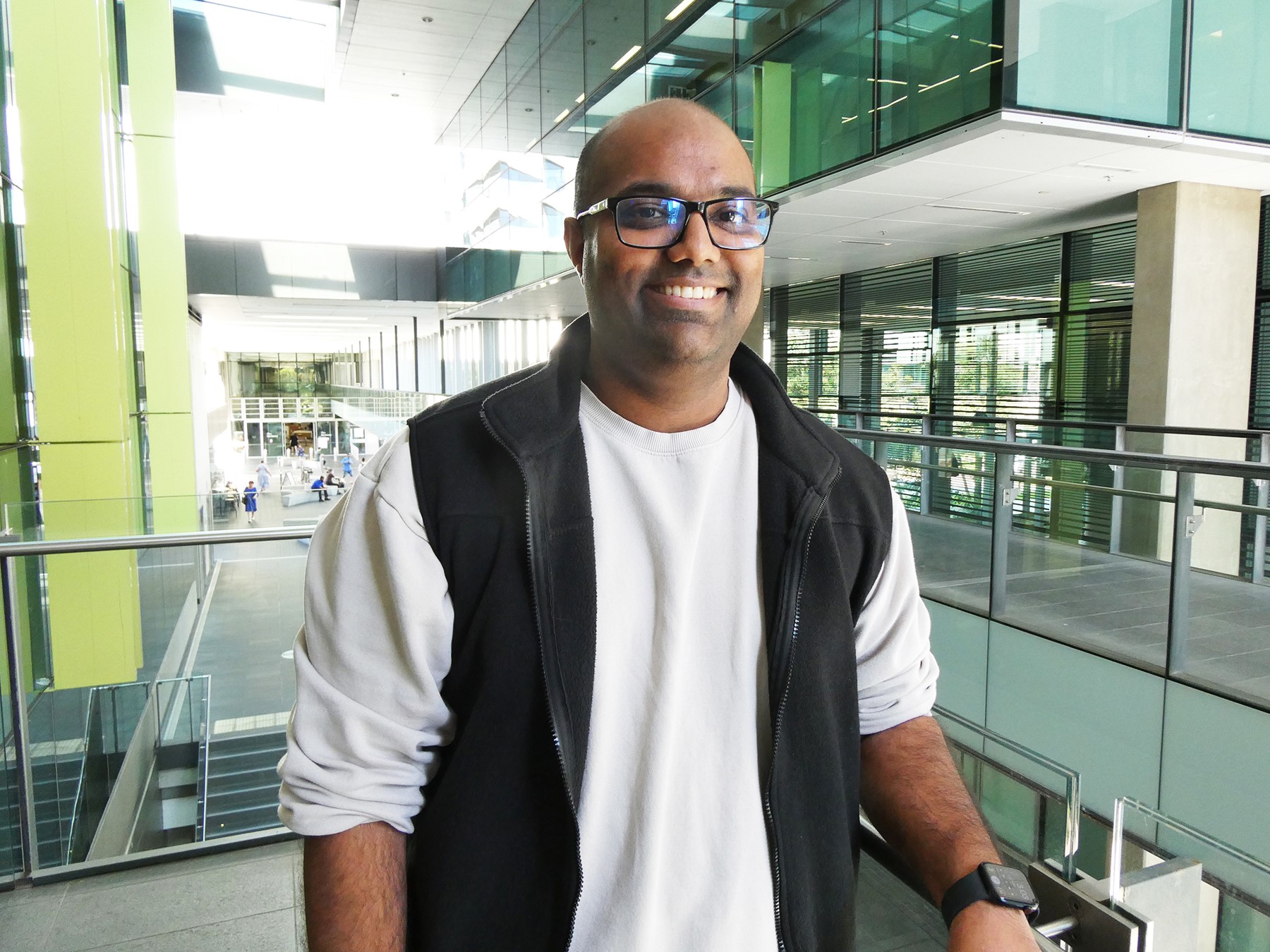Microbiology Medical Scientist – one of two winners of the 2023 ASM Jim Pittard Early Career Award
 Dr Shakeel Mowlaboccus
Dr Shakeel Mowlaboccus
Congratulations to Microbiology FSH Medical Scientist, Dr Shakeel Mowlaboccus for being one of two recipients of the 2023 Australian Society for Microbiology (ASM) Jim Pittard Early Career Award.
Dr Mowlaboccus shared ‘I am honoured to have received the 2023 ASM Jim Pittard Early Career Award. This award is presented to two early career microbiologists each year and it was a pleasure sharing it with Dr Luu from the University of Technology Sydney. I felt extremely proud that my research and contributions have been recognised by the society and it has motivated me to work harder towards my goal for a career in Microbiology. Of utmost importance, this award gave me the opportunity to present at the ASM conference in the Awards Lecture session, providing me with a platform to share my research vision with leaders in the field of microbiology.’
The contribution of Dr Mowlaboccus’ research to Microbiology
Dr Mowlaboccus’ research focuses on the characterisation of clinically significant bacteria using whole genome sequencing with an emphasis on molecular surveillance and antimicrobial resistance mechanisms. At the time of application, Dr Mowlaboccus was 4 years post-PhD and had a total of 30 peer-reviewed publications, 22 of which were published in the previous 3 years.
The following are the local, national and international impacts of Dr Mowlaboccus’ research to Microbiology.
Local
- Shakeel’s studies on the molecular epidemiology of Neisseria meningitidis were the first to characterise clinical meningococci from Australia using whole genome sequencing.
- Dr Mowlaboccus’ study on linezolid-resistant Enterococcus faecalis provided insight into the most common molecular mechanism of linezolid resistance in WA. Linezolid is considered a drug of ‘last resort’ for severe infections caused by gram-positive pathogens.
National
- During Dr Mowlaboccus’ collaboration with the Australian Group on Antimicrobial Resistance, Shakeel sequenced and analysed more than 5,000 genomes of Staphylococcus aureus and Enterococcus faecium causing bacteraemia across Australia and provided important knowledge on the evolution of methicillin-resistant S. aureus (MRSA) and E. faecium.
- Shakeel’s cross-sectional surveillance studies on Escherichia coli causing urinary tract infections (UTIs) in Australia have provided insight into the incidence and molecular mechanism of fosfomycin resistance. Given fosfomycin had recently been licenced for treating acute uncomplicated UTIs in females over 12 years old, the studies allowed clinicians to confidently prescribe fosfomycin, knowing the level of resistance to the drug was low in this demographic.
International
- Dr Mowlaboccus’ study on the penicillin-resistant clade of serogroup W meningococci, published in the Emerging Infectious Diseases journal, was the first to identify and describe such isolates. Phylogenetically similar isolates were later detected in Europe, Canada, and USA, and are now termed isolates from the ‘Australian penicillin resistance-associated lineage’ by other researchers.
- Shakeel’s study on penicillin-susceptible S. aureus (PSSA) bacteraemia is one of only two studies that provide genomic data on PSSA bacteraemia. Although the incidence of PSSA bacteraemia has significantly increased worldwide, little is known about the genetic diversity of these isolates. The findings of Dr Mowlaboccus’ study and the analysis workflow employed will be critical as more PSSA bacteraemia isolates across the globe are sequenced and compared.
In addition to contributing to research in Microbiology, a desirable criterion for applicants was to demonstrate active participation in ASM affairs. Having won two ASM travel awards during Dr Mowlaboccus’ PhD (the ASM-WA branch travel award in 2015 and the ASM National travel award in 2017), Shakeel wanted to give back to the society. Dr Mowlaboccus said ‘I supervised an ASM Summer Scholarship awardee in 2018 and I joined the ASM WA branch committee in 2019 to help with their activities. I highly commend the support and opportunities ASM provides to our current and future microbiologists. I am currently the Chair-Elect for the ASM WA branch committee.’
When asked how research in Microbiology enhance the future of the discipline, Dr Mowlaboccus said ‘Research drives the advancement of any field. In Microbiology, research is crucial to better understand the behaviour of microorganisms (bacteria, fungi, parasites and viruses) and their interaction with their host and the environment. Microorganisms are living organisms and therefore evolve constantly via changes in DNA during replication or via acquisition of DNA from their surroundings. In Medical Microbiology, ongoing research is important to improve our knowledge of microbial diversity, enhance our understanding of the mechanisms used by microbes to infect and transmit, develop new diagnostic techniques to detect resistant pathogens rapidly, discover new drugs/targets for therapy, and prevent disease. The extensive use of antibiotics has driven the rise in antibiotic-resistant microorganisms, threatening the treatment of infectious diseases. With the persistent rise in antibiotic resistant pathogens in the hospitals and the community, there is an ever-growing need for research to continue to survey, control, and combat antimicrobial resistance.’

